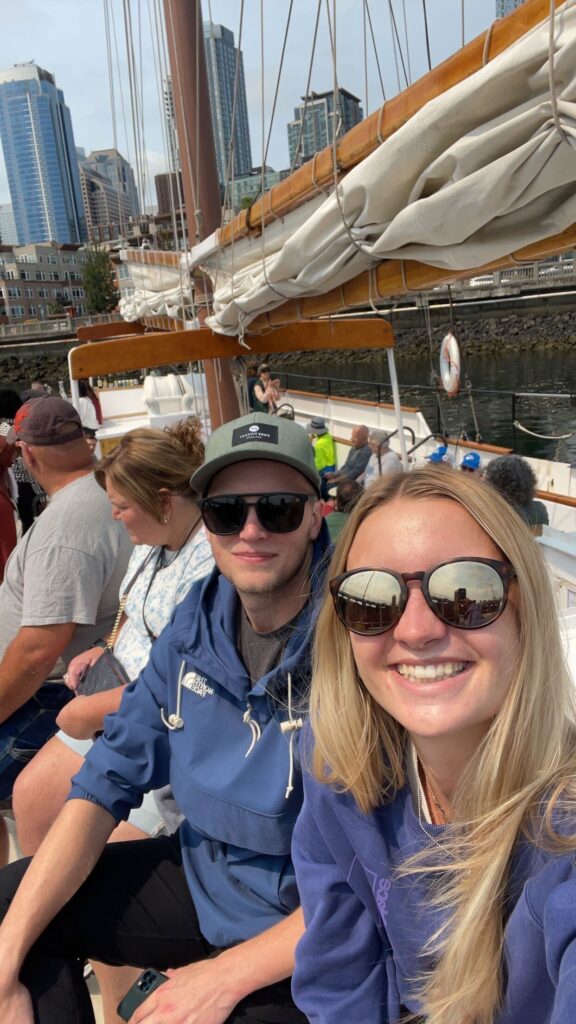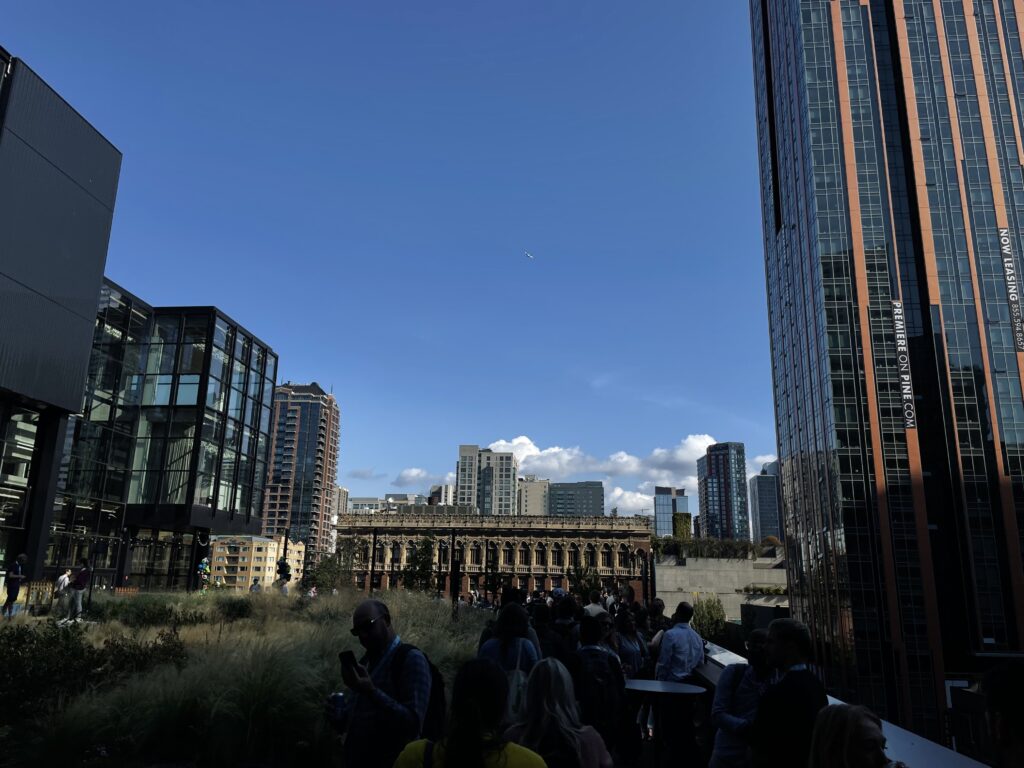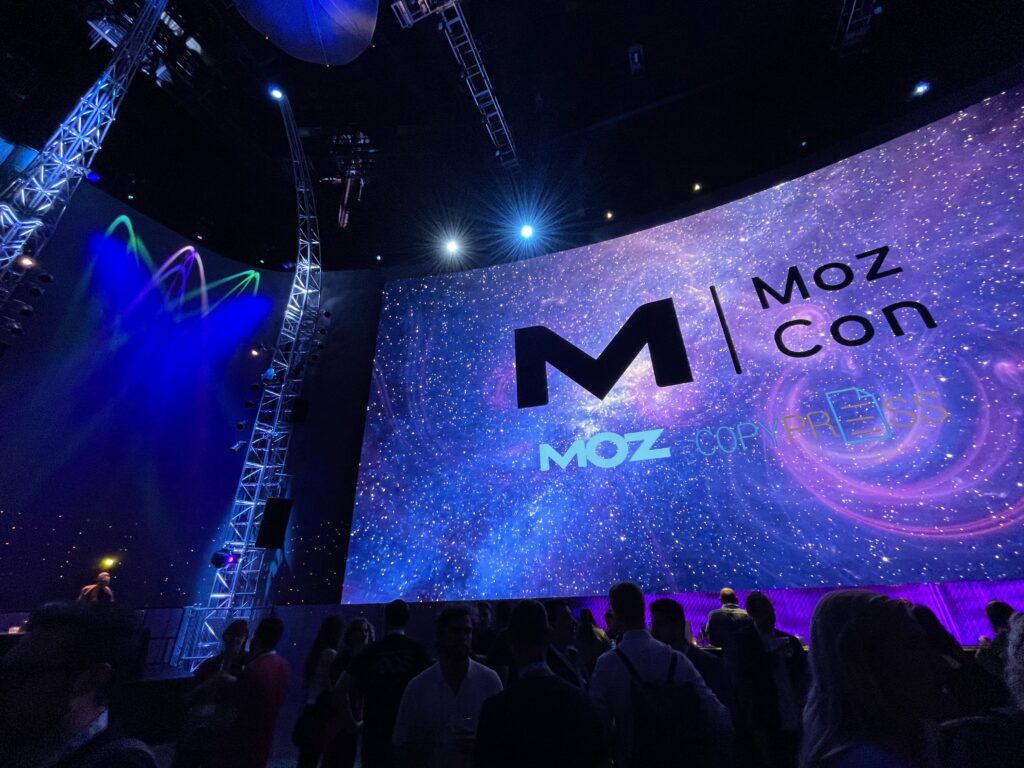Table of Contents
Fresh off the vibrant streets of Seattle, we are still buzzing from the sessions at MozCon. Among the overwhelming number of insights, one message rang clear: SEO is not dead. Diving deep into the world of search marketing, we've distilled our favorite talks into this article, blending their insights with our perspectives. Keep reading to learn more about our MozCon 2023 highlights and game changers.

Senior SEO Analysts Skye & Ben enjoying a boat ride before the start of the conference.
Our Favorite Talks
There are countless snippets of information we took away from MozCon, which made deciding on our favorite talks that much harder. Below are our top five!
Tom Anthony’s Contextual SEO - Shifting from an Entity focus to a Contextual focus
Tom Anthony made a compelling case for the evolution of search. He highlighted the transitions from the Keyword era (1998-2018) to the Entity era (2018-2024), and now, as we approach the Context era (2024 - ?). The rise of ChatGPT, particularly the GPT aspect, is what Tom believes will revolutionize Google's understanding of context. He introduced the term “Context & the Latent Lail” to describe this upcoming era.
Tom shared his recent experience searching for a vacation home on AirBnB. Ideally, he wanted to search: "Show me holiday itineraries for a family of 5, with a toddler-friendly pool and near the beach & some restaurants, in or near Europe." However, due to the keyword-oriented nature of current search interfaces, he had to simplify his query to: "Holiday villas in Europe."
Our Take
The limitations of structured data and entities in representing explicit context are evident. With GPT models capable of understanding any context without the need for structured markup, the future of search is set to undergo a significant transformation. As GPT becomes more integrated into search, traditional structured data's importance will diminish.

Views from the Day 1 happy hour on the roof of the convention center.
Dr. Pete’s SGE isn’t going to be a thing
Dr. Pete entertained the audience with his humorous take on Google's SGE search results. He showcased the often comical outcomes and juxtaposed them with the capabilities of ChatGPT. Dr. Pete envisions a bifurcated search landscape: use Google when you know precisely what you're seeking, and turn to a GPT model for context-rich queries when you're unsure.
Dr. Pete highlighted the hilarity of Google's SGE results and demonstrated how ChatGPT can be a valuable tool for SEOs. He shared an instance where he used ChatGPT to generate playful sample copy for a site mock-up, aligning with the brand's tone.
Our Take
The future of search is leaning towards contextually rich content. As Bing's image suggests, the real opportunity for SEO lies in delivering content that understands and meets user intent. SEOs should be prepared to leverage this shift to their advantage.
Chris Long’s Offensive SEO
Chris Long reminded the audience of a fundamental philosophy: "The best defense is a great offense." He questioned why many SEOs feel they're constantly on the defensive and provided insights on how to regain an offensive stance in SEO campaigns.
Chris differentiated between defensive and offensive SEO strategies. While defensive SEO reacts to changes and fixes issues, offensive SEO proactively identifies opportunities and dictates initiatives. He then went into sharing actionable steps for SEOs to adopt an offensive approach, such as identifying new content opportunities, prioritizing technical fixes, and embracing AI to streamline workflows.
Our Take
Chris's emphasis on being proactive resonated deeply. In the ever-evolving world of SEO, it's crucial to stay ahead of the curve. By embracing AI and focusing on offensive strategies, SEOs can drive impactful results and dictate the direction of their campaigns.
Carrie Rose’s Manipulating Search Demand Through Cross-Channel Tactics
Carrie presented several examples of how she manipulated search volume through campaigns across other channels. She emphasized that as search marketers, we know what people want. Why can’t other channels tap into this more?
Zara is an example of doing it wrong. They did a huge influencer marketing push to feature their famous pink jeans. Searches went up by 112%, but when you search for pink jeans, they’re nowhere to be found. Rise at Seven reverse-engineered this. They looked at categories they rank number one for, then dialed in on a specific product category. Once they optimized those pages, they worked with influencers to promote the style, did a PR push for links to these categories, etc. Everyone started wearing the style, and search volume went up by 841%.
Our Take
As an SEO agency, connecting with our client’s marketing channels is top of mind. We have access to behavioral data that other channels can’t always get their hands on. In SEO the framework is often around showing up where the demand is. It’s a mixture of that, plus fueling the demand through cross-channel tactics. We’re looking forward to bringing these ideas to our Ecommerce clients.
Lily Ray’s Intent Switches During Core Updates
Lily kicked off the conference with a topic we all encounter (and sometimes, fear). We began by discussing the several factors that can impact a site's ranking, including site-wide quality issues, aggressive advertising, thin or duplicate content, and content lacking Expertise, Authoritativeness, and Trustworthiness (E-A-T).
Deceptive affiliate links, overly salesy content, especially in Your Money or Your Life (YMYL) topics, and fake authorship can also negatively affect rankings. Changes in user behavior, world events, and the rise of authoritative sources play a role in these updates. When responding to these updates, it's essential to base reactions on observed data, utilize SEO tools for before-and-after comparisons, and diversify content types beyond just text.
Our Take
Not only did Lily echo our perspective on taking a proactive approach to algorithm updates, but she also created a perfect outline for how to think about showing up for people in the new age of search. We especially liked her point on creating different kinds of content to target different intents. It’s no doubt that this will be the best approach as the organic landscape gets more competitive by the day.

The MozCon after party hosted at Seattle's MoPOP.
See You Next Year!
Big thanks to Moz for an excellent conference, and to Uproer for sending us. We're looking forward to implementing our learnings across clients and staying in touch with the friends we made

